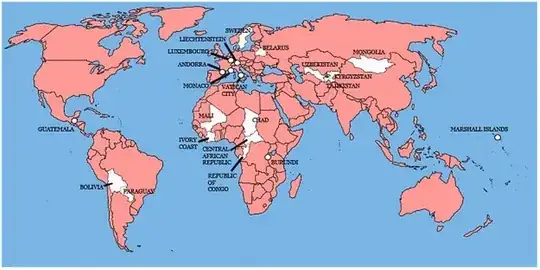The claim is based on (Laycock 2012). It clarifies the claim:
Out of 193 countries that are currently UN member states, we've invaded or fought conflicts in the territory of 171.
The Telegraph's coverage of this book clarifies further:
Only a comparatively small proportion of the total in Mr Laycock's list of invaded states actually formed an official part of the empire.
The remainder have been included because the British were found to have achieved some sort of military presence in the territory – however transitory – either through force, the threat of force, negotiation or payment.
Incursions by British pirates, privateers or armed explorers have also been included, provided they were operating with the approval of their government.
So, many countries which once formed part of the Spanish empire and seem to have little historical connection with the UK, such as Costa Rica, Ecuador and El Salvador, make the list because of the repeated raids they suffered from state-sanctioned British sailors.
From the introduction in (Laycock 2012), he states what he included and excluded in his count of "invasions".
- British forces set foot on soil - included
- Naval actions in other countries' waters - included
- Air raids - not included
- Negotiated/paid presence - included
- Incursions in support of the locals (D-Day, for example) - included
- British soldiers in foreign armies - not included
- Pirates - included if they had official approval
Thus, the author is using a different definition of "invade" than commonly accepted:
To enter in a hostile manner, or with armed force; to make an inroad or hostile incursion into. (OED)
Samples
To give a sampling of the types of activities that (Laycock 2012) counts, I'll give summaries of the first few countries alphabetically:
- Afghanistan - An 1838 attempt at regime change by a 21,000 person British army, among other events.
- Albania - Royal Navy captured a French corvette on the Albanian coast in 1809. British troops landed in Albania in 1915 to help the Serbian army evacuate. In 1918, the Second Battle of Durazzo. Others.
- Algeria - The British navy battled the Barbary Corsairs, based in Algeria, in 1682. Britain attacked Algeria in 1816, attempting to end the slave trade. In 1942, Operation Torch.
- Andorra - One of the 22 countries that the author did not count as invaded. He noted that some British airmen used Andorra as an escape route from France.
- Angola - "650 British troops on UN duty set foot in Angola in 1995 as part of Operation Chantress to help protect a ceasefire. A friendly invasion."
- ... and so on. I don't think I can reproduce much more of the book without implicating copyright.
Summary: it depends on definition
Whether one considers this claim true depends on whether one accepts the loose definition of "invade" used by the book's title and headline writers.
Addressing the specific doubts in the question
"And when was the last time we invaded Finland?"
In the Continuation War, the United Kingdom "declared war on Finland on 6 December 1941".
References
Stuart Laycock. All the Countries We've Ever Invaded: And the Few We Never Got Round To. History Press Limited, 2012
Jasper Copping. British have invaded nine out of ten countries - so look out Luxembourg. The Telegraph. November 4, 2012.
